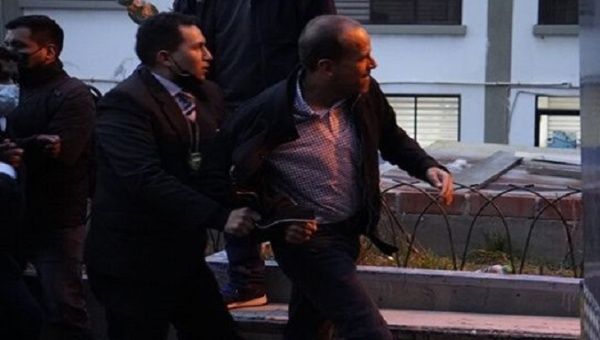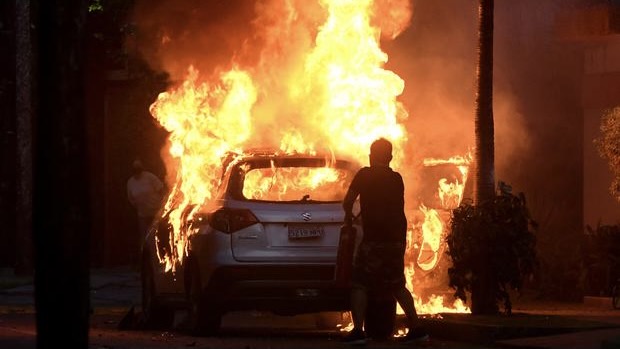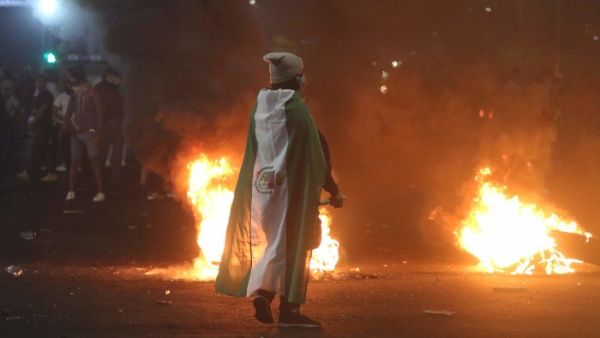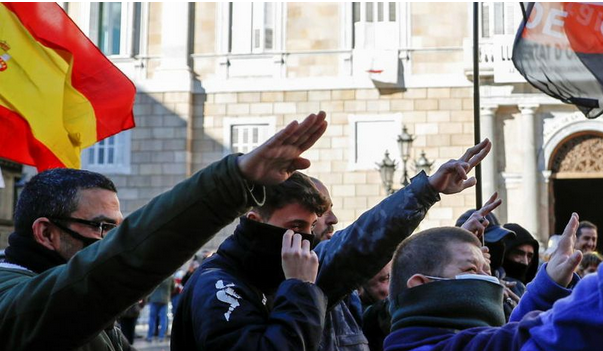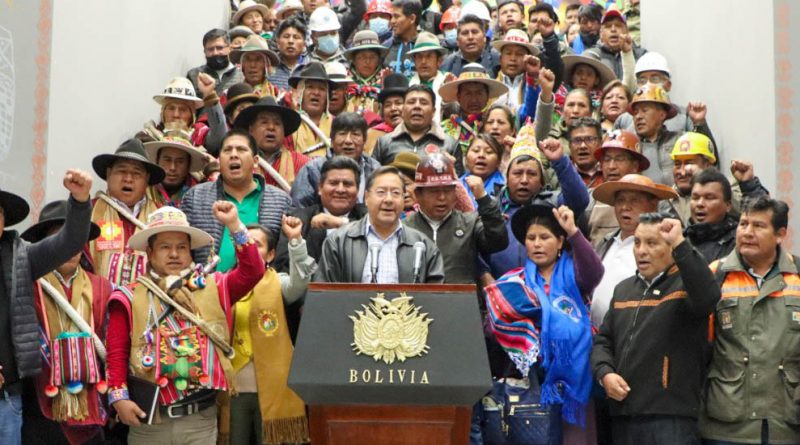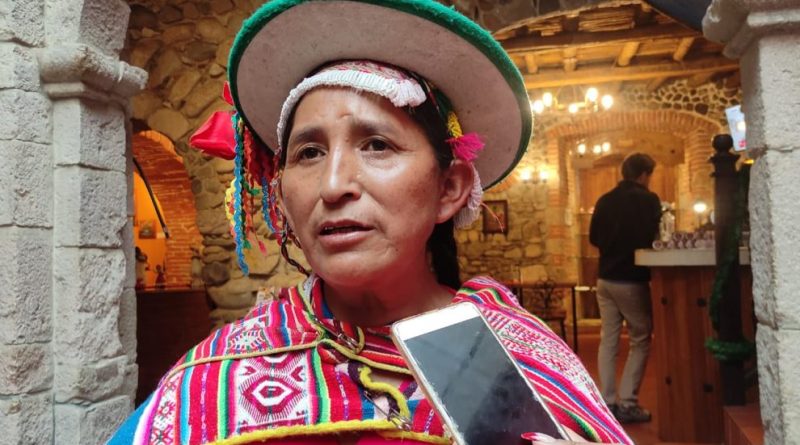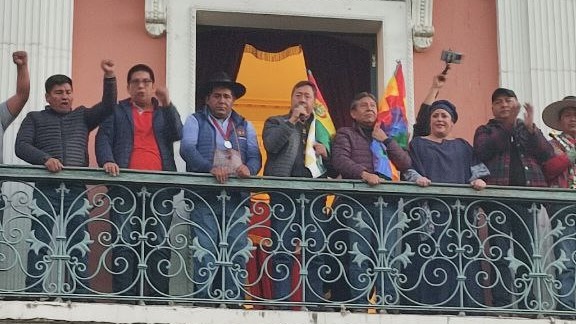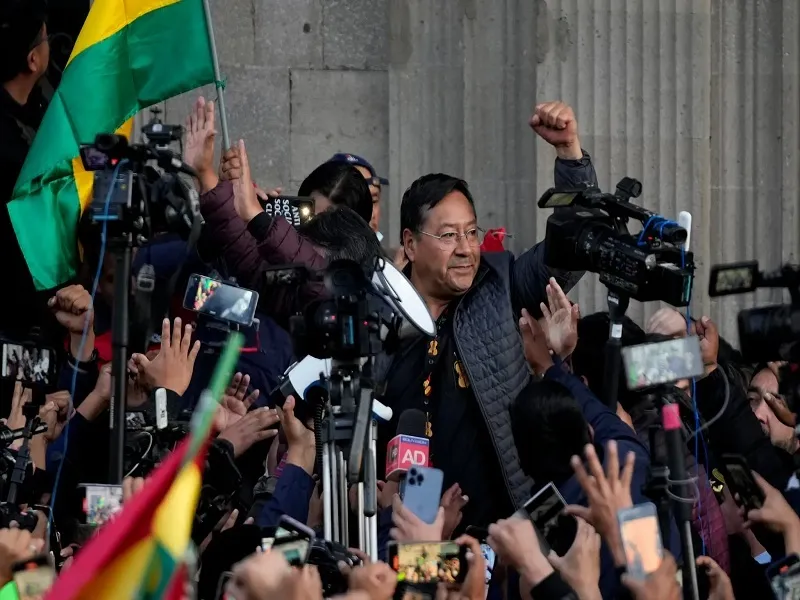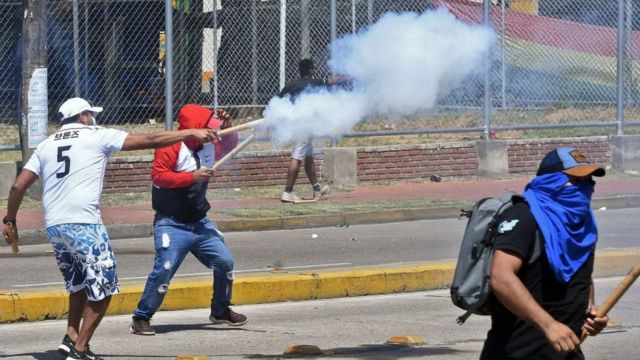
Bolivia: Far-Right Protesters Attack Ambulances & Health Workers
November 23, 2022Bolivia, Santa Cruz
Far-right opposition groups in the city of Santa Cruz, Bolivia, are violating international law by attacking health workers and hindering the passage of ambulances. The city’s police have registered more than 20 cases of physical attacks against health workers and ambulances, many of them resulting in patients being unable to reach a medical center.
Protesters say they want the national census to be brought forward six months, and their preferred tactic is to block roads and demand payment from anyone who wants to pass through. Those who fail to comply are assaulted by young men armed with sticks and baseball bats. The secretary of the Health Workers union at the San Juan de Dios Hospital, Ulises Guzmán, said, “I don’t know what they are waiting for, maybe for someone from our sector to die so that they just give us guarantees?”
International Human Rights Law (IHL) establishes that medical personnel have the right to be protected under the same conditions as the wounded and sick, even in situations of armed conflict.
“The detention of health personnel, for the fact of providing health care, can be equated to a violation of human rights, even when done legally, in accordance with national legislation,” states the International Red Cross.
Violent protests have been ongoing for a month now. Other incidents include an arson attack on the indigenous campesino federation building in the city (FUTCSC), and the looting of the workers union federation (COD), along with numerous government buildings. The pretext is a demand to bring forward the national census, but the government say that this is merely an excuse used to justify violent mobilizations aimed at launching another coup.
By Kawsachun News
https://kawsachunnews.com/bolivia-far-r ... th-workers
**************
THE SCENE OF THE COUP IN BOLIVIA RETURNS: CENSUS, STRIKE AND COUNTER-STRIKE
22 Nov 2022 , 11:54 a.m.

On November 1, in the Santa Cruz municipality of La Guardia, there were clashes between residents who tried to intervene in a fence installed by social organizations that asked that the strike be lifted due to the Census (Photo: Page Seven)
In a cyclical manner, a new scenario of regime change returns in Bolivia at the hands of the same coup actors in the streets, but under different conditions than in 2019, when the right-wing orchestrated similar attacks.
Since October 22, opposition leaders from the eastern region of Santa Cruz de la Sierra declared an "indefinite civic strike" (regional strike) contrary to the provisions of Executive Supreme Decree 4760 that was promulgated on July 13, this year. This is a modification of a previous Decree , 4546 of July 21, 2021. Through this promulgation, the Executive decided to postpone the Population and Housing Census originally scheduled to start on November 16 of this year, postponing it to May or June 2024.
The original decision was made by consensus in the National Council of Autonomies with the governors of eight of the nine regions, with the exception of Santa Cruz de la Sierra, where the destabilizing actions have been carried out, blocking circulation in the city in other departmental areas and notably affecting the local economy and daily routine.
They demand that the census be carried out in 2023 , the excuse for the color escalation. Since its inception, both in the capital and in other areas of the region there has been confrontation, with deaths, injuries and damage to public property. In particular, in the municipality of La Guardia, on November 1, with the balance of several injuries , six vandalized police patrols, looted the police command, used firearms and nine activists from the Cruceñista Youth Union (UJC) were apprehended, later that social movements "encircled" the city to " unblock " the strike.
In a report from August 2021, both the Cochala Youth Resistance (RJC) and the UJC were described by the Inter-American Commission on Human Rights (IACHR) as responsible for many excesses that occurred around the coup against Evo Morales. UJC is a right-wing terrorist organization, with a supremacist and ultra-religious ideology, financed by the bourgeoisie that controls the governorate of Santa Cruz.
WHY THE POPULATION AND HOUSING CENSUS ?
Bolivia has not carried out a census or a housing cadastral map since 2012, which would make it possible to define new parameters and indicators that would facilitate, among other things, development plans, regional budgets and, also, the expansion of political representation seats.

President Luis Arce has defined the census as "a true national, departmental and municipal planning tool" (Photo: La Razón)
Product of mainly technical reasons (and investment), the national executive decided to reschedule the registration planned for this 2022, in order to obtain a more consolidated instrument and be, in the words of President Arce, "a true tool for national, departmental and municipal planning ". However, the decision-making process in the middle of the year was not exempt from roughness, first affirming the officialization of the census for 2022 itself, delivering results in 2023 (Supreme Decree 4645) and then, after the review, proposing a new date.
Although it has been emphasized that the reasons for the reprogramming are strictly technical, this first moment of contradiction has facilitated, first in July for 24 hours, and now since the end of October as an indefinite one, the creation of a device that reactivates the destabilizing mobilization against the decision.
The main promoters of the strike did not put forward consistent political reasons, rather revealing their interest in activating new campaigns of destabilization and political violence with the census as an excuse.
ACTORS AND STRUCTURES AT THE FOREFRONT OF INDEFINITE UNEMPLOYMENT
The main actors and events have occurred in the department of Santa Cruz de la Sierra repeating protagonists: the current governor Luis Fernando Camacho; Rómulo Calvo, president of the Committee for Santa Cruz; and Vicente Cuellar, rector of the Gabriel René Moreno Autonomous University, who also chairs the Inter-Institutional Committee to Promote the Census, the entity that allegedly promotes and decides on the actions in question.
On the plane of direct action, once again (as in 2008 and 2019), the UJC operates. In tow, and with the usual lack of force, the former president, former presidential candidate and leader of the Comunidad Ciudadana alliance, Carlos Mesa, expressed his solidarity in a tweet on November 2 with "the inhabitants of La Guardia and with the journalists attacked by groups of shock masistas" blaming Evo Morales for putting together a "fratricidal plan", ordering President Arce to "abstract" from Evo's alleged "plan", since the latter has called , on multiple occasions, for a "sincere dialogue" Between the parts.
Mesa's statements outline the usual matrix and largely points to politically active figures in the government. Said distemper accentuates, without forcefulness, the attempts to unify the story of the despotic government.
FRAME SETTING: THE CONFLICT
Eight of the nine Civic Committees in the country (the one in Cochabamba said it was in consultation) announced a day before the decision to go on an indefinite national strike if Decree 4760, the lifting of the "siege" on the city of Santa Cruz ( by social movements of various kinds) as a measure of popular pressure , the installation of a dialogue table and the "pacification of the country".
On the other hand, the government, represented in this case by the presidential spokesman and the Minister of Planning, announced the creation of a technical table to define a definitive date for the census, establishing as starting points for the negotiation: 1) that the determination of the date itself will remain open, 2) that it be determined within the framework of the table, and 3) that the technical commission be installed.

As an extension of the National Council of Autonomies held in July, governors, mayors, rectors of public universities, indigenous and Gran Chaco authorities met with the government in October to discuss the Census (Photo: File)
The presidential spokesman, Jorge Richter, emphasized that with these points it was possible to "advance", since he affirmed that Santa Cruz leaders were present, in particular from the Inter-institutional Committee for the Promotion of the Census, affirming that, as a result of the conversation, a fourth point would be the unemployment lifting, something discussed with the counterpart from Santa Cruz.
While the opposition was excluding itself from the spaces for dialogue with crossed statements that showed cracks in its apparent "homogeneous" unity around the demand for the census for 2023, on the government side it also highlighted its own split in the discourse from the disavowal of his own government minister, who a day before declared that it was technically impossible to carry out the census in 2023. Through the Vice Ministry of Communications, he said that this was a personal position of the minister and not of the government as a whole.
Such setback could have caused a cost, either by detachment or by correction, within the framework of habitual actions of the already known procedures of coup de color. A new circumstantial demand on the side of the Pro Santa Cruz Civic Committee is added: the release of those detained for the events of November 1 in La Guardia.
The Minister of Development Planning, Gabriela Mendoza, announced at the time that the census could be carried out on November 16. Apparently, she rushed without having all the elements of the case a priori. The global pandemic caused delays in the stages and preparatory elements that must be included in these censuses. Not only in Bolivia but in 14 countries that decided to postpone its realization for two years.
Last Friday, November 11, President Arce announced in a message to the population that the census date will be March 23, 2024 and the subsequent distribution of resources will be made in September of the same year. He made a chronology of the milestones that marked this conflict since the state initially set the census date for November 16, 2022, and then convened on July 12 the National Council of Autonomies that brings together all levels of the state, in in which regions such as Beni and Pando raised their concerns regarding the harvest season and weather aspects, and the only absentee was Camacho.
In that body, it was decided by consensus to carry out the census between May and July 2024 to ensure an inclusive process that reaches all Bolivian households. The national president listed the dialogue and socialization of the census process with different representative actors from July 12 to November 2, 2022, touring the nine departments, until the call for the Plurinational Summit for a Census with Consensus held in Cochabamba, in the that the representatives of the inter-institutional committee of Santa Cruz also left the spaces.
Finally, the technical commission was formed with 41 delegations from governorates, mayors, indigenous autonomous universities, the United Nations Population Fund (UNFPA) and the Latin American and Caribbean Demographic Center (CELADE) to analyze and define the date of the census. Some technical teams from Santa Cruz, Tarija and La Paz left these spaces, where they worked for more than 50 hours during four days, analyzing and listening to the different proposals.
After months of tension, Arce said that this decision on the date of the census could no longer be delayed, and valued its importance for the development of public policies:
"As a State and society as a national government and subnational governments we have to know without speculation, what is our demographic, social, economic and identity reality of the Bolivian men and women who inhabit this territory, based on that information we must work public policies oriented towards an integral development that benefits all Bolivians", said the president, who the next day promulgated Supreme Decree 4824 that guarantees the aforementioned.
DEJAVU FROM 2019 ?
Once again, the motor of the indefinite strike and the challenge to the government comes from Santa Cruz, both from its formal structures (government) and parastatals (Civic Committee, Inter-institutional Committee), the latter where true power operates in an almost unrestricted manner in the region. President Arce himself patented it on November 1, stating that "they set in motion a strategy to reissue the 2019 coup"; However, perhaps as a provisional mitigation, an exact consensus is not in sight to that of the last stage of 2019.
Mayors such as those of Cochabamba and Santa Cruz, both opponents of the government, either support the decision to postpone the census or condemn the strike and its political and economic effects.

The Bolivian Episcopal Conference (CEB) has promoted dialogue since the beginning of the escalation of the conflict (Photo: First Report)
On the other hand, something similar can be said of the role that the ecclesiastical hierarchy has played, either in the voice of the Archbishop of Santa Cruz opposing the indefinite strike or of the Bolivian Episcopal Conference (CEB) itself in promoting dialogue since the beginning of the escalation. of the conflict, which can be traced to the open town hall in the Santa Cruz capital on October 11, for dialogue and the suspension of the strike. A position that has also been assumed early on by the National Chamber of Industries (CNI), to which are now added the unions of merchants and transporters from the city of Santa Cruz itself that are demanding the lifting of the indefinite strike.
On the front of the military establishment, President Arce emphasized the constitutional role and the side of the people, whose High Command was also changed on November 1, and whose lack of details could produce an ambiguous signal. The essential spurs, being the same as in 2019 under the same methodology, support the possibility of this danger, despite some signs (church, industrial and economic groups) are not acting under the same mold as in the coup day three years ago.
Only to that extent could a clearer difference be established, since there is also a critical gap that also facilitates the objective conditions for the coup factors to consider that there is a new opportunity to act: the government itself and the elements of dispersion that reflected in some social movements as a gap to act.
More recently, the Central Obrera Boliviana and the Confederation of Peasant Women have demanded that the Arce government and the State Attorney General's Office create a "National Commission of Prosecutors" to investigate the very serious acts of racist violence that occurred in Santa Cruz, assuming that deals with crimes of terrorism and armed uprising against the Bolivian state.
TOWARDS THE CONSOLIDATION OF DESTABILIZATION
There have been some visible mitigating factors such as the lack of an absolutely homogeneous and unified consensus on the part of the opposition; that variable of the unstable equilibrium could turn it in the interested direction. However, it is possible that the good economic indicators in Bolivia have forced several unions not to join a strike that would be deleterious for such figures in the midst of the post-pandemic.
The social forces that the opposition tried to mobilize in other parts of the country together with their political allies (the former minister of the de facto government of Jeanine Añez and mayor of La Paz, Iván Arias, or the mayor of Tarija, Johnny Torres) never came to be. massive. In La Paz, the right-wing activists organized by Arias were neutralized in the streets by the mobilization of self-convened social sectors under the banner of defending the process of change.
In Cochabamba (Bolivia's third city in population, located in the center of the country) Camacho's ability to convene was very low. In the aforementioned Tarija, in southern Bolivia, the skirmishes between civic citizens and some right-wing university students with the militant groups of the Movimiento al Socialismo (MAS) showed few conditions for the civic leadership to guarantee a departmental strike.
In the city of Santa Cruz (first in population and the one with the greatest economic activity in Bolivia) businessmen begin to distance themselves from the regional strike that is no longer "an investment" as it was to finance the 2019 coup against MAS, but rather which is rather reporting economic losses.
The definition of a call for a national strike by the Civic Committees of the rest of the country, among similar pressure actions, did not take effect and now, 30 days after the indefinite strike, the union members of Santa Cruz request the suspension of pressure measures to be able to take advantage of the high demand that is generated at the end of the year.
On the other hand, this week begins the treatment in the Legislative Assembly of the census law that will include the allocation of seats before 2025, a condition to resolve the conflict. The MAS in the Chamber of Deputies will arrive divided to the session; the "radical" bloc (supported by Evo Morales) warned that they will vote against the census bill against the "renovators" (supported by Arce and Vice President Choquehuanca) who will make its approval viable. While the opponents agreed to defend that the survey be carried out in 2023.

A sample of the internal struggles in the MAS is the meeting of Evo Morales with some MAS deputies in Cochabamba to discuss the debate on the Census law in the Lower House (Photo: File)
A latent danger is represented by the very fragility within the struggles within the government, of the Movement Towards Socialism - Political Instrument for the Sovereignty of the Peoples (MAS-IPSP), the agenda contradictions of the social movements and, therefore, a unifying synthesis within all these political channels capable of establishing a more effective containment.
The latest denial/delegitimization of the rest of the government against its own minister who is in charge of the Interior portfolio (a not so silent struggle that has some time left) is, in itself, the most pernicious sign, but not the only one, of the risks that can offer a split or a substantial crack on the side of the field of the forces that restored democracy with political, social and electoral mobilizations in 2020.
Another sensitive sample with social movements that were fundamental during the resistance actions already speak of dangerous internal disagreements with other social and political fronts , whose main expression could be the march of the red ponchos, who will flood the city of La Paz to vindicate their statement pending petitions with the government.
It could be reaffirmed that neither the government nor the social movements are in the state of languor that defined the coup process from July to November 2019, but this does not prevent the rupture of the unstable balance, based on the internal differences themselves, fostering the possibility that sooner rather than later the line of defense of the Arce government breaks, and the coup violence advances, if more concrete measures are not taken in defense of the governability of the central state, and of knowing what, how and when to make concessions, and even more important, when not to do them, to the raised side.
For his part, Morales has declared more than once that there was no danger of a coup, contrary to Arce's warnings; He debated some political differences through the media and not in organic spheres, such as the appointment of the president of the Chamber of Deputies in the Legislative Assembly. He did so with the date chosen to carry out the census and ended up indirectly accusing Arce and Choquehuanca of "traitors" who operate against the MAS unit, actions that accelerate the breakup of the bloc that supports the government.
At this time, in Bolivia few actors have emerged unscathed from the ongoing conflict. This week will most likely be defining moments.
https://misionverdad.com/globalistan/vu ... contraparo
Google Translator



